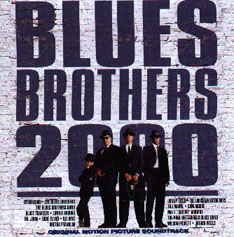

Rating: *** (3 out of 4)
Availability: Widely available
Blues Brothers 2000 was probably one of the best movies that nobody saw. It was smart and funny, and acted as a fitting sequel to the first one. But that doesn't matter. What matters is the soundtrack.
The point of the Blues Brothers has always been to bring the music to the public attention, and the soundtrack of the first movie accomplished just that, spotlighting acts like Ray Charles, Aretha Franklin, and James Brown, not to mention the fantastic blues stylings of the Blues Brothers Band, which is comprised of some of the greatest modern Blues musicians itself.
The soundtrack for the sequel achieves similar success in presenting a mix of blues music for the listener to enjoy. Aretha Franklin recorded a new version of "R-E-S-P-E-C-T" for the soundtrack to satisfy her fans that were disappointed that she didn't sing it in the first movie. In addition, the CD contains work from musicians such as John Popper, Jonny Lang, Blues Traveler, and The Carl LaFong Trio. Dr. John and The Blues Brothers Band deliver a creepy rendition of Donovan's "Season of the Witch," while the impressive new Blues Brother, Joe Morton, is captivating in "Funky Nassau." Equally impressive is John Goodman, the actor known for his roles in The Babe, Barton Fink, and Roseanne. His voice carries some of the early Blues Brothers songs in the movie and fills the songs with soul. If he ever decides to move into a singing career from acting, he has a definite future.
The highlight of the album is "How Blue Can You Get," performed by The Louisiana Gator Boys. If the group name sounds unfamiliar, it may be because you're more familiar with their solo names: B.B. King, Jeff "Skunk" Baxter, Gary U.S. Bonds, Eric Clapton, Clarence Clemons, Jack DeJohnette, Bo Diddley, Jon Faddis, Isaac Hayes, Dr. John, Tommy McDonnell, Charlie Musselwhite, Billy Preston, Lou Rawls, Joshua Redman, Koko Taylor, Travis Tritt, Jimmie Vaughan, Grover Washington Jr., Willie Weeks, and Steve Winwood.
The soundtrack loses a star for sins of omission. In particular, the movie opens with an a capella version of "John The Revelator," which is only present in part on the soundtrack at the beginning of the full choir version. In addition, as those of us who stayed through the credits know, James Brown recorded a song for the very end of the movie which is left out of the soundtrack for some inexplicable reason. Except for these omissions, this is probably one of the best soundtracks in my collection.
The opinions expressed in the above reviews are those of Glen Williams and may not represent the views of slac.com or any of its members. Compliments, complaints, and comments should be addressed to gandalf@tricon.net
Reproduction or transmission of the reviews in whole or in part without permission is prohibited.